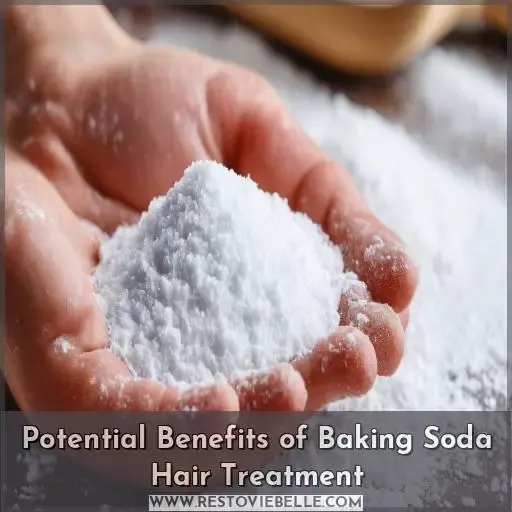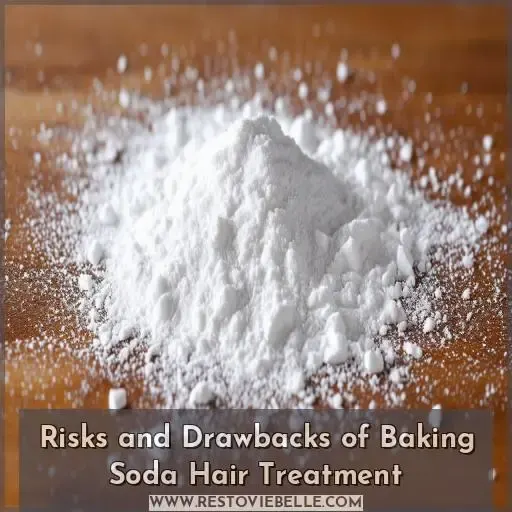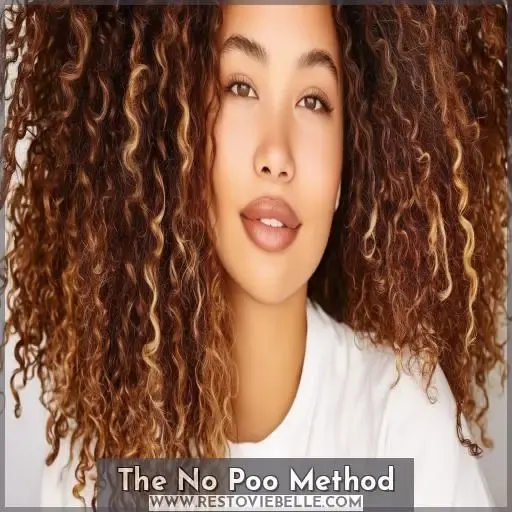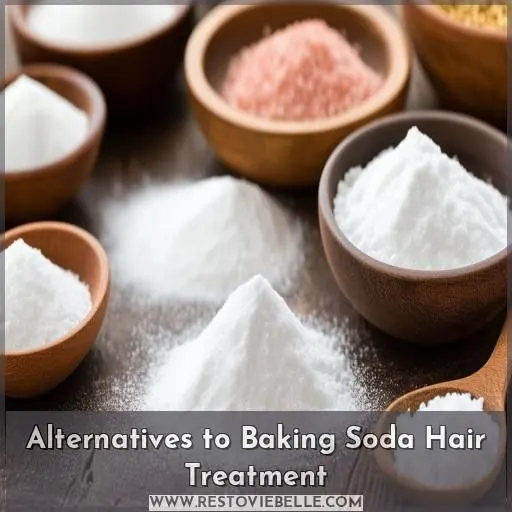This site is supported by our readers. We may earn a commission, at no cost to you, if you purchase through links.
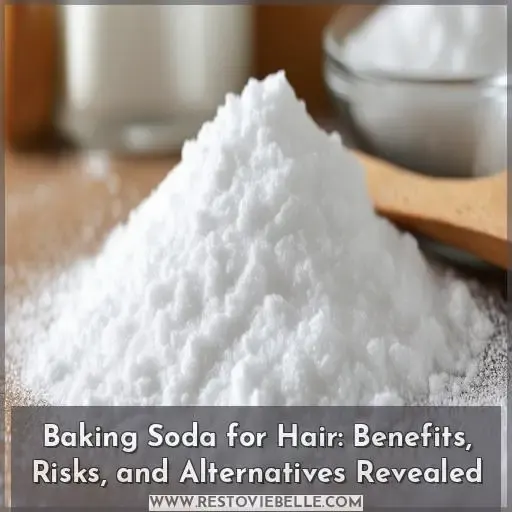 Is baking soda good for your hair? The short answer is: it’s a mixed bag.
Is baking soda good for your hair? The short answer is: it’s a mixed bag.
Baking soda can help remove excess oil and buildup, softening strands and boosting shine.
However, its high pH of 9 can damage your hair’s cuticle, leading to breakage, frizz, and irritation.
The infamous "no poo" method using baking soda scrubs and vinegar rinses doesn’t balance your scalp’s pH either.
So while baking soda has some benefits, the risks make exploring gentler alternatives like clarifying shampoos or Coconut oil a wise move.
But don’t take my word for it – keep reading to learn more about examining the pros and cons.
Table Of Contents
Key Takeaways
- Listen, baking soda for your hair is like a double-edged sword – it can temporarily revive lacklustre locks, but overuse is a recipe for disaster, leaving you with a dried-out, frizzy mess that’ll make you want to hide under a hat.
- Imagine a world where your scalp feels like it’s sunburned and your strands are so brittle, they snap like twigs underfoot. That’s the harsh reality of baking soda’s High pH level doing a number on your precious tresses.
- Sure, it’s a cheap and easy way to clarify your hair, but it’s like using a sledgehammer to open a walnut – you might get the job done, but at what cost? Your poor strands will be begging for mercy.
- At the end of the day, moderation is key. An occasional baking soda treatment might give you that fresh-from-the-salon shine, but making it a regular thing is just asking for trouble. Why not play it safe and stick to gentler alternatives that won’t leave your hair crying for help?
Is Baking Soda Good for Your Hair?
No, baking soda is generally not recommended for hair care. While baking soda can remove excess oil and buildup, it has a high pH level that can damage the hair cuticle and lead to dryness, breakage, and frizz.
Potential Benefits of Baking Soda Hair Treatment
You may have heard that baking soda can help remove excess oil and buildup from your hair, leaving it softer and shinier. With a pH level of 9, baking soda is an alkaline substance that can potentially help break down residue on the hair and scalp.
Removes Excess Oil and Buildup
You crave control over your hair’s greasiness. Baking soda’s absorbent nature helps:
- Soak up excess oils and sweat
- Clear buildup from hair products
- Lift dirt and grime from the scalp
- Prevent dandruff and scalp irritation
- Revive dull, lifeless strands
However, use caution – baking soda can dry out and damage fragile hair types.
Softens Hair
You may have heard that baking soda softens hair. While it can potentially help, it’s important to use it with caution.
| Pros | Cons |
|---|---|
| May temporarily soften hair | Can damage cuticles, leading to dryness |
| Inexpensive DIY treatment | Alkaline pH can disrupt scalp health |
Consider using coconut oil or a gentle conditioner instead for softer, healthier hair.
Restores Shine
Baking soda’s abrasive nature helps remove buildup, restoring shine. However, long-term use risks cuticle damage and frizz. While some swear by this natural method, others report hair damage and scalp irritation. Carefully weigh the benefits against potential risks before incorporating baking soda into your hair routine.
PH Level of 9
While baking soda’s pH level of 9 is often touted as a benefit, it can actually cause:
- Scalp irritation
- Cuticle damage
- Hair breakage
- Frizz
This high alkalinity can strip your hair and damage its protective outer layer, leading to dryness, tangles, and overall weakening over time.
Risks and Drawbacks of Baking Soda Hair Treatment
While baking soda can initially remove excess oil and product buildup, its high pH level of around 9 can severely damage your hair’s cuticle layer, leading to dryness, breakage, frizz, and scalp irritation. The risks associated with using baking soda as a shampoo replacement far outweigh any potential short-term benefits, making it an unsuitable long-term solution for maintaining healthy hair.
Cuticle Damage
Baking soda’s high alkalinity can chemically burn your scalp, causing dryness, sensitivity, and irritation. Imagine a 4×3 table with your hair falling out, brittle strands, and a raw, inflamed scalp—not pretty! Prolonged use roughens the outermost layer (cuticle) of hair strands, leading to permanent damage and hair loss.
Hair Breakage
You could experience hair breakage from baking soda treatments. The high pH disrupts your cuticle, leading to weakened strands susceptible to snapping. With continuous use, you’ll see split ends and shorter hair over time. Avoid the risks of cuticle damage and scalp irritation with baking soda’s pH imbalance.
Frizz
Hair frizz is another issue with baking soda. You’re stripping your hair’s cuticle, leading to:
- Increased porosity and dryness
- Rough, damaged texture
- Unruly flyaways
- Split ends and breakage
This dull, dry frizz undoes any volumizing or cleansing benefits, especially for color-treated hair.
Irritation
Continuing the discussion on risks, baking soda’s high pH level can irritate your scalp, causing inflammation and dryness. This might lead to an allergic reaction, with redness, itching, and even hair loss. It’s imperative to do a patch test first to avoid any unpleasant surprises on your delicate skin.
The No Poo Method
The "no poo" method involves using a baking soda scrub and diluted apple cider vinegar rinse as an alternative to commercial shampoos and conditioners. However, this method doesn’t balance the scalp’s pH level and may stress out the scalp, so it’s recommended to patch-test on a small area of your skin before using.
Baking Soda Scrub
Baking soda scrubs can lead to:
- Scalp irritation from the high pH
- Long-term hair/scalp damage
- Dryness and brittleness
While touted as a "natural" method, proceeding with caution is wise. Consider:
- Patch testing first
- Using diluted baking soda
- Not overdoing the vinegar rinse
Diluted Apple Cider Vinegar Rinse
Following the baking soda scrub, you’ll rinse with a diluted apple cider vinegar solution. This vinegar rinse helps remove residue, but it can cause scalp irritation if used excessively. Many claim it promotes hair growth by improving scalp condition, though evidence is limited.
Does Not Balance the Scalp’s PH Level
The pH imbalance caused by the baking soda-vinegar rinse fails to maintain scalp health. Research shows this method disrupts the scalp’s natural pH balance, potentially leading to irritation and damaging hair over time. Exploring alternative methods that respect your hair’s pH needs is advisable for effective results.
May Stress Out the Scalp
The no poo method may stress your scalp out, leading to:
- Scalp irritation
- Scalp inflammation
- Hair follicle damage
- Scalp dryness or overproduction of oils
This harsh treatment disrupts your scalp’s natural balance. Proceed with caution.
Patch-test on Your Skin Before Using
You must always do a patch test before applying baking soda or any new product to your scalp and hair. Baking soda’s high pH could irritate your skin barrier, leading to redness, itching, or other unpleasant reactions. Protect your skin by patch testing first to check for adverse effects.
Alternatives to Baking Soda Hair Treatment
Instead of using baking soda on your hair, consider gentler alternatives like clarifying shampoos to remove buildup, coconut oil for nourishment, quality conditioners for manageability, silicones for smoothness, or keratin treatments for strength and shine. These options can maintain your hair’s health without the risks associated with baking soda’s high alkalinity.
Clarifying Shampoo
Instead of the "no poo" baking soda method, try a clarifying shampoo. It deeply cleanses hair without the risks of long-term baking soda or apple cider vinegar use. Clarifying shampoos remove buildup while gently cleansing, making them a safer alternative.
Coconut Oil
Another alternative, coconut oil, offers benefits as a nourishing hair mask: mix it with honey for a hydrating treatment. It’s also an antibacterial skin moisturizer that may promote natural hair growth.
Good Conditioner
After using coconut oil, you’ll need a good conditioner. It replaces lost moisture, smooths the cuticle, and prevents frizz and breakage. Look for conditioners with beneficial ingredients like proteins, ceramides, and oils. Use it after every shampoo for the best hair health.
Silicones
You could also try silicones for hair health. They’re synthetic ingredients that shield strands, taming frizz and boosting shine. But read labels carefully – some silicones can build up over time, requiring clarifying shampoos to remove residue.
Keratin
You could try keratin as an alternative. Keratin:
- Is a structural protein in hair/nails
- Helps repair damage and boost shine
- Comes in treatments, shampoos, conditioners
- May cause build-up or weigh hair down
- Has natural or synthetic forms available
Frequently Asked Questions (FAQs)
Is baking soda safe for color-treated hair?
You’ll want to think twice before reaching for that baking soda. While it may seem like a cheap, natural option, using it on color-treated hair can lead to disastrous results – stripping color and causing severe damage. Steer clear and opt for gentler, color-safe products instead.
How often should baking soda be used?
You shouldn’t use baking soda on your hair more than once every 1-2 weeks. Frequent use can strip your hair’s natural oils, leading to dryness, breakage, and irritation. Stick to occasional clarifying treatments and focus on gentle, moisturizing routines.
Can baking soda damage hair over time?
Yes, baking soda can damage your hair over time. Its high alkalinity opens your hair cuticles, leading to frizz, dryness, and breakage with repeated use. Safer clarifying options include diluted apple cider vinegar or a sulfate-free clarifying shampoo.
Is baking soda better than commercial shampoos?
Commercially available shampoos are generally better than baking soda for your hair. While baking soda can remove buildup, its high pH can damage and dry out strands over time.
Do hair porosity and texture affect results?
Like a chameleon’s skin, your hair’s porosity—its ability to absorb moisture—affects baking soda’s results. Coarse, porous hair may benefit more, but fine hair is likelier to suffer damage.
Conclusion
The double-edged sword that’s baking soda for your hair demands caution.
While it may temporarily revive strands, prolonged use risks cuticle damage, breakage, and an imbalanced scalp pH.
Accordingly, exploring gentler alternatives like clarifying shampoos or coconut oil is prudent if you value retaining your hair’s integrity.
As for whether baking soda is good for your hair, moderation and vigilance are key.
